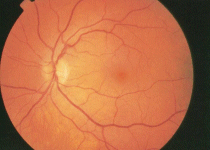Diabetes can impact eyes in several ways. Understanding the ways that diabetes can harm eyes is important to maintaining healthy eyes that see well for a lifetime.

Diabetes is commonly thought of as “that sugar disease.” Although diabetes does have something to do with sugar, the condition has many more serious problems associated with it in addition to not being able to freely eat candy bars. It can cause heart disease, kidney failure, amputations, and blindness. Of course, being an eye doctor, the focus of my care is on this last complication of the condition.
All people with diabetes, including people on oral medication as well as the insulin dependent diabetics, need to have a dilated eye exam at least once a year . Dilation means using eyedrops to enlarge the pupils so that we can see more of the inside of the eyes to check for signs of the disease. It does not seem to be commonly known, but the leading cause of blindness in American adults is diabetes. Diabetes not only affect eyes in one way, but by three entirely different processes. Diabetic retinopathy is damage to the blood vessels of the retina (the retina is the light sensitive layer in the back of the eye). This condition causes the blood vessels inside the eye to swell and leak fluid. Additionally, sometimes new blood vessels form, but they are abnormal and also leak fluid. Of course the real problem here is that much of this can be going on without any symptoms of vision changes or pain. The central sharp vision can be unaffected while blood vessels are leaking in other parts of the eye. Cataracts, which are a clouding of the eye’s lens, also form as a result of diabetes. Glaucoma which is an increase in fluid pressure inside the eye that leads to optic nerve damage and a loss of vision can also be caused by diabetes.
Diabetic retinopathy, cataracts, and glaucoma are not the only the things that are being tested at the yearly eye examination but certainly these are amongst the most important. These things can cause blindness if not treated but if caught in time, can be treated and blindness prevented. Of course, yearly dilated eye exams are a bit of a nuisance but the price that may be paid for ignoring it is unnecessary blindness.
The actual statistics of who gets diabetic retinopathy are rather alarming. Just about half of all the people with diabetes will develop some degree of diabetic retinopathy in their lifetime. The longer someone is a diabetic, the more likely they will develop the eye complications. Since the eye problems are not necessarily noticed by the person with diabetes, there are recommended protocols so that these problems can be identified and treated promptly. Many national organizations have come together to establish the best way to treat diabetes and vision loss. The American Diabetes Association, The National Eye Institute, The National Institutes of Health, and The Public Health Service are a few of the organizations that have joined in this common venture.
November is National Diabetes Month. If you or someone you know is a diabetic, please take the time to think about how devastating would be the impact of blindness. With timely diagnosis of the problems, there are treatments available to preserve the precious gift of sight. How long has it been since your eyes have been examined?
